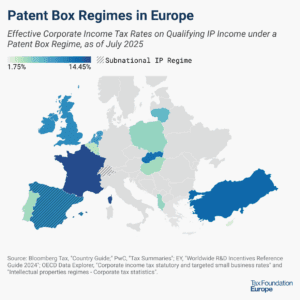
Fiscal Forum: Tax Foundation Europe Interview with Italian Vice-Minister Maurizio Leo
5 min readBy:In February, I had the opportunity to interview the Vice-Minister for Economy and Finance of Italy, Maurizio Leo, about the taxA tax is a mandatory payment or charge collected by local, state, and national governments from individuals or businesses to cover the costs of general government services, goods, and activities. policy priorities of the Italian government. A lightly edited transcript from that interview is below and shows a commitment to reforming rules that create legal uncertainty and support competitiveness.
Daniel Bunn: What would you say are the tax reform goals for this government?
Vice-Minister Maurizio Leo: Starting from August 2023, when the parliament approved the tax reform delegation law, we have approved 15 decrees. This work has never been done since 1971. Our government is working hard on this important goal.
We have two important goals. The first goal is the simplification of the system. Our system was very complicated for taxpayers and businesses. For instance, regarding tax returns, misunderstanding was common. It was possible that the taxpayer would read a great amount of guidelines and laws for filling in a proper tax return but then also he could lose the meaning of the objective—that is to pay the correct amount of taxes. Therefore, due to a misinterpretation, it was possible that the taxpayer could incur an administrative penalty or, even worse, a criminal penalty. It goes without saying that criminal penalties have a relevant negative impact on large taxpayers.
The second goal is certainty. Now with our system, we have changed the approach so it’s possible to have an ex-ante dialogue between tax administration and taxpayers. In the past, if you received a notice of assessment (NoA), the possibility of starting litigation with the tax office was very high. And it was probable to end up in court. Bear in mind that in Italy we have three degrees of courts—first degree, second degree, and Supreme Court)—and it was very, very difficult for both the tax administration and the taxpayer to reclaim their money. This is not a problem anymore with the new tax reform as you have a chance to solve the problem before the NoA gets to the taxpayer.
Daniel Bunn: So now you can avoid criminal liability and the long court process, and you have a little more certainty from the beginning?
Vice-Minister Maurizio Leo: Absolutely, yes. Indeed, with the new tax reform, a solution or agreement can be reached between the tax administration and the taxpayers. We now have a much-simplified system that encourages an ex-ante dialogue with the taxpayer.
Daniel Bunn: There’s been a lot of talk on competitiveness, including the report from Draghi. I’m curious how you think of simplification in the context of competitiveness, domestically or internationally.
Vice-Minister Maurizio Leo: As I said before, simplification is the best way forward for us because we believe that having fewer rules is better . . . and that’s the reason why we agree with what Mr. Draghi stated in his report on this point. If international institutions and our tax system work well together in a synergistic manner, there will certainly be a very positive outcome for both taxpayers and businesses.
Regarding simplification, for instance, we have the following two legal institutions. The Biennial Preventive Arrangement, which is an important tool for small companies, and the tax administration. We can avoid problems ex ante, if the taxpayer accepts the solution that is proposed by the tax administration for two years. Another example I can mention is Cooperative Compliance for large companies. It’s a very, very useful tool. We also introduced the pre-filled tax return as of 2019. We also reformed the tax code and brought in the simplification of litigations.
Daniel Bunn: Excellent. So, you have a lot of priorities and opportunities here domestically but there’s development at the OECD, the United Nations, and the various EU directives and things happening in my home country of the United States, including our pending tax reform. So, tax policy is becoming even more critical in international relations. How do you see the future path for these international discussions? Is this the end of multilateral tax discussions or kind of a bump in the road? I’m curious how you see the multilateral discussion.
Vice-Minister Maurizio Leo: Oh, it’s always important to have an open discussion on international tax issues. However, it’s better not to necessarily change the present situation. A stable tax framework creates certainty. We live in a globalized world, and trade and finance play a very big role. There is room for bilateralism, but in my view, multilateralism is paramount. National tax systems that ignore international rules may damage the economy and, more specifically, entrepreneurs. For instance, imagine the relevance of the problem of double taxationDouble taxation is when taxes are paid twice on the same dollar of income, regardless of whether that’s corporate or individual income. for citizens and companies. For us, it’s key to avoid such problems.
Daniel Bunn: Yes, because multiple and double, even sometimes triple layers of taxation, reduce the incentive to invest and can harm the attractiveness of a country. Related to the multilateral discussion, Pillar Two is impacting fiscal strategies across the world. Obviously, there’s some uncertainty from the new Trump administration. But are there investment incentives in Italy that need to be shifted with respect to Pillar Two because of the top-up tax? Are there investment incentives that need to be rethought?
Vice-Minister Maurizio Leo: We introduced Pillar Two into our legislation after the EU Directive 2022/2523. For Pillar Two, we don’t have any problems because our tax rate is higher than 15 percent. But the issue is that we’ll have to wait to see what the administration of President Trump in the United States wants to do. We have a good relationship with Mr. Trump, and I think it’s possible, together with the EU, to find a good agreement on these matters. I don’t think it would be a good solution if only Italy and some other countries applied Pillar Two. I also read the US memorandum, and I believe it has a very strong tone. However, we want to have a dialogue with the United States to try to find a common agreement for both Europe and the United States.





